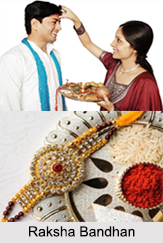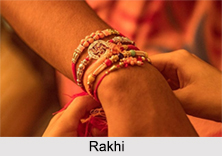 Celebrated on a full moon day on the last day of the Hindu calendar month of Shraavan, the festival of Raksha Bandhan is observed in various parts of the Indian subcontinent. Raksha Bandhan is a cultural and secular festival, which signifies the bond of protection and care between a brother and sister.
Celebrated on a full moon day on the last day of the Hindu calendar month of Shraavan, the festival of Raksha Bandhan is observed in various parts of the Indian subcontinent. Raksha Bandhan is a cultural and secular festival, which signifies the bond of protection and care between a brother and sister.
On this day, the sister ties an amulet sort of thing which is called a rakhi, on the brother"s wrist and symbolically protects him against evil influences, and prays for his long life and happiness. In return, the brothers make a gift of promise that they will protect their sisters from any harm.
Origin of Raksha Bandhan
The origin of the festival of Raksha Bandhan is based on two cultural traditions: folk culture and the traditions in the sacred Hindu texts. According to folk art and literature, in the rural areas, the festival name of Raksha Bandhan is varied with location and is known as Saluno, Silono and Rakri. In the festival tradition of Saluno, the sisters place shoots of barley behind the ears of their brothers. On the same day as Saluno, the ceremony of charm tying or Raksha Bandhan is also held, when the domestic Brahmin priest ties a charm in the form of a polychrome thread, bearing tassel plums on the wrists of each patron.
There are also mention of Raksha Bandhan in the Uttara Parva of the Bhavishya Purana, where Lord Krishna celebrated Yudhishthira, the eldest Pandav, the ritual of having a band of protection or rakhi tied on his right wrist by the royal priest on a full moon night at the end of the month of Shraavan.
 History of Raksha Bandhan
History of Raksha Bandhan
Raksha Bandhan has a historical background when about 3000 B.C. the Aryans entered India through the north-western passes and settled in north- western India. They brought with them their traditional custom, Raksha Bandhan. It was a tradition among the Aryans to have a `Yajna` or a sacrificial ceremony before any war to invoke God`s blessing for protection and security. Before the men departed for the battlefield the womenfolk tied an anointed sacred thread or amulet and thus the custom of Raksha Bandhan came to be.
Evolution of Rakhsha Bandhan
With the passage of time, there has been a shift in the rituals associated with the festival of Raksha Bandhan and have spread beyond the traditional regions and have been transformed through technology and migration. Urbanization and Hindi movies has played an important part in influencing the ritualistic rites of this traditional festival. Now, with easy means of communications, there is an option of using the postal service to post the rakhi or another contemporary alternative way is to virtually send the amulet of protection. Modernisation has made the festival of Raksha Bandhan a popular festival in India and abroad.
Celebration of Raksha Bandhan in Different States
Raksha Bandhan is primarily a North and West Indian Festival but is celebrated in other parts of India as well. In South India, it is called Avani Avittam and is an important day for the Brahmins. They first take a holy bath and then remove their Janeyu or holy thread and put on a new one while chanting the Vedic mantras. Later, they take the pledge of Brahmanic rites given in the holy books. The Janeyu is a thread of 3 rounds and represents the vow for adherence to Vedic culture, observance of Hindu traditions and service to humanity. The ceremony is called Shraavani or Rishi Tarpan or Vpa Karma and signifies the cleansing of the mind of all- evil. It holds special significance for the Brahmins and for people of higher castes.
The festival of Raksha Bandhan is also observed in the states of West Bengal, Odisha, Gujarat and Maharashtra. After the ceremony, sweets made from coconut, like coconut- barfi and sweet coconut rice, are served.
In North India, Rakhi Purnima is called Kajri Purnima or Kajri Navami. It is a season when wheat or barley is sown and the farmers worship Goddess Bhagwati for a good crop. It is called Saluno in Haryana. In Gujarat, on the Rakhi Purnima, they offer water and pray to Lord Shiva for forgiveness. And in Maharashtra, Raksha Bandhan is celebrated along with Narali Purnima, which is a coconut day festival.
The festival of Raksha Bandhan has transcended the norms of typical familial ties and has evolved into this transformed tradition, where people who are not related by blood can also tie rakhi. This is known as voluntary kin relations or fictive kinship and is above the lines of caste, class or racial divisions.



















